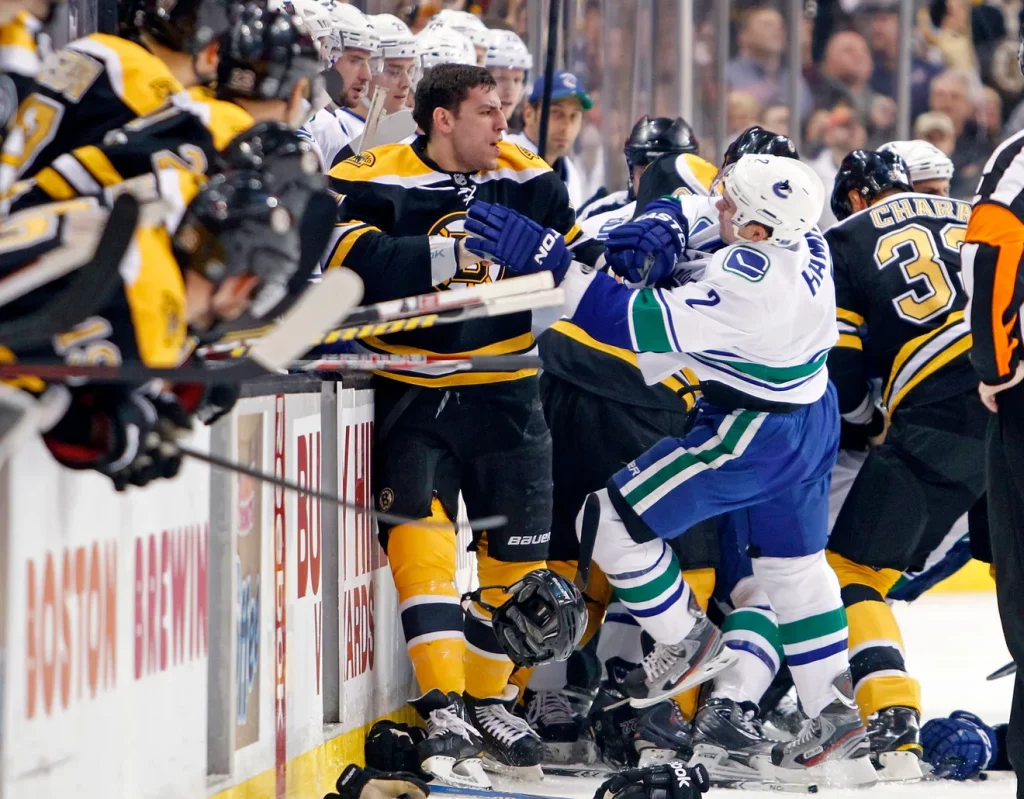
By: Theo Lander | Follow me on Twitter @lander_theo
The Boston Bruins are not the gang of rough-housers that they once were. The sport has evolved into a more skill-based game at the National Hockey League level. While this has made the game more fun to watch from a talent perspective, I feel we are missing some of the things that made us (me) fall in love with the sport in the first place.
Don’t misinterpret the point I’m trying to make here; I love how hockey is currently played in the NHL. This style of play more closely resembles the flow of the game at the IIHF World Junior Championships. I have always said that the World Junior Championship is the second best ice hockey tournament of the year, behind the Stanley Cup Playoffs.
The game’s speed on a large sheet of ice compiled by the best young and up-and-coming talent that the sport has to offer while representing their nations is appointment viewing for any sports fan. It’s impossible to watch and not feel these athletes’ emotions when you see them score a critical goal, followed by celebrating to the fullest extent.
The underlying message is this: the game naturally becomes more exciting when every player on the ice has elite skill and speed. While the NHL doesn’t possess the same youthful spirit that the World Juniors does, it has, without a doubt, become more aligned to that play style. This is much more normal nowadays compared to the start of the millennium. For example, look at the flow of play in this game from 2004 (also note those beautiful NESN graphics). The puckhandling is much more choppy, the transition game is way slower, and the players focus on physical play a lot more than they would in today’s game:
Bruins-Habs Game 1 2004 4/7/04
Again, I prefer the current fashion of play at the NHL level, but I miss this. More than anything, I miss the “Big Bad Bruins” and the feeling they conveyed to the TD Garden faithful. Hockey purists will hate this, but the Bruins had a secondary asset to their game that affected their opponent’s ability to perform; they were physically imposing. I do not advocate for more fighting in the NHL, as I prefer hockey players to play hockey and not bare-knuckle box while wearing blades on their feet, but it was fun to see the Bruins refuse to be pushed around or get bullied.
If you finished a hit late and too high up, if you hacked at the goalie, if you got away with a dirty play, there were consequences. The rush of adrenaline when anticipation hit the air at the sight of Milan Lucic or Zdeno Chara or (insert former Bruins tough guy here) hunting down an offender was a thrilling experience. The best example of this is the regular season beating the Bruins put on the Habs in 2011:
Remember when Shawn Thornton challenged Matt Cooke after his dirty hit on Marc Savard? On the broadcast, Andy Brickley said, “Well, if you’re not going to suspend (Cooke), Jack, let’s go the other way. Make him play the 60 minutes tonight”. This was a reality that we weren’t too far removed from those days. Some players took it upon themselves to police the game when the officials did not, and the fans loved it. Just watch the reaction from the crowd at the end of that bout:
Were you looking for a more extreme example? How about when former coach Mike Milbury assembled his goon squad in response to Bruins legend and current President Cam Neely being the target of a knee-on-knee collision with Ulf Samuelsson?
Mike Milbury “declared war” on the Pittsburgh Penguins after the controversial hit. So in the next game, he added Allen Pedersen, Bob Beers, Lyndon Byers, and Nevin Markwart to the lineup. They combined for just seven goals all season while tallying up 235 penalty minutes. Not to mention, this was during the Wales Conference Finals. The fanbase today would be in an uproar if the Bruins added four goons to the roster for a playoff game. However back then, this was seen as a valid tactic by Milbury. “War is war,” said Chris “Knuckles” Nilan when asked about the decision.
Is it wise to retaliate to every little thing the other team does/gets away with? Absolutely not, and I wouldn’t want to see my favorite team resort to meathead tactics to try and win a hockey game. Ask any hockey fan, and they’ll tell you that often the player who retaliates is the only one penalized, which of course, unnecessarily hurts their team. With that being said, it was a lot of fun, and who has more fun than us?
So yes, the NHL and the Bruins have, without a doubt, changed for the better. The game is much faster and more skillful than ever before, and with the wave of new talent that will be brought up in this culture on their way to the big show, this will get even more refined. While it may be frustrating for older fans to see players skate away from a contentious scenario, we must recognize that it is the most optimal route to success. A team that can control its emotions in high-pressure situations is more dangerous than any enforcer that has ever stepped foot on the ice.
Moral victories should not get in the way of actual victories, and this current style of play favors that notion. Without a shadow of a doubt, I prefer this version of Bruins hockey and certainly have no complaints about the evolution of this league. We may see an occasional glimpse of those old school remnants here and there, but over time they will be phased out completely. We as fans should hold on to those memories while also understanding why those days have been put behind us.
I must confess in the same breath that I miss the “Big Bad Bruins.”
Postscript: The Bruins bullying the Canucks in games three and four of the 2011 Stanley Cup Finals is one of my core memories. 11-year-old me was absolutely losing his mind in a crowded New England basement with all my buddies. That team had an attitude that many have imitated, but none have replicated. That was a magical run that we probably won’t ever see the likes of again, and that’s the way it should be.


Leave a Reply